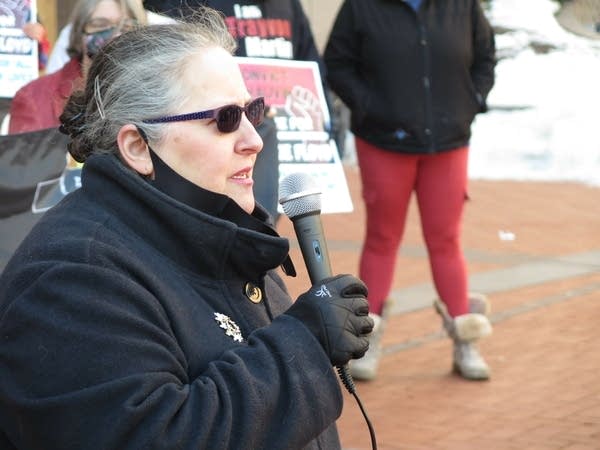Attorney General Garland to reveal investigation into the Minneapolis Police Department

Go Deeper.
Create an account or log in to save stories.
Like this?
Thanks for liking this story! We have added it to a list of your favorite stories.
Join MPR News for live coverage at 10 a.m. Listen here.
U.S. Attorney General Merrick Garland is scheduled to be in Minneapolis Friday to announce the results of an extensive investigation into the city's police department — particularly officers’ use of force. The probe is widely expected to result in long-term federal court oversight of the MPD.
In April of 2021, the day after a Hennepin County jury convicted former police officer Derek Chauvin of murdering George Floyd, Attorney General Merrick Garland announced that the Justice Department would take a close look at the Minneapolis Police Department’s policies, training, supervision, and its use of force.
For more than two years, Justice Department staff interviewed police, city officials and people who’ve alleged mistreatment at the hands of officers. Investigators did not focus on a single incident; instead they took a systemic look at MPD to determine whether officers are violating citizens’ Constitutional rights.
Turn Up Your Support
MPR News helps you turn down the noise and build shared understanding. Turn up your support for this public resource and keep trusted journalism accessible to all.

The inquiry is expected to result in a consent decree — a legal agreement that would require the police department to implement changes. A group of monitors, including attorneys, would make regular compliance checks and report to a federal judge.
Cities including New Orleans, Cleveland, and Newark are all under consent decrees after the DOJ found patterns of civil rights violations. Among other things, the agreements require stronger civilian oversight, updated use-of-force policies, and data collection to ensure policing is free from racial and ethnic bias.
University of St. Thomas law professor Rachel Moran studies police accountability and said in an interview Thursday that consent decrees generally result in meaningful change, but it’s never instantaneous.
“There’s a mix of satisfaction. Some cities would say our police department has really changed for the better and it’s worth it to have these years-long consent decrees,” Moran said. “And others say it has cost a lot of money and it seems like two steps forward, one step back.”

Complying with consent decrees is expensive. Since Cleveland’s took effect in 2015, the city has spent between $6 million and $11 million each year. The Marshall Project reported in September that nearly a third of that was the cost of monitoring. Moran said departments may also need to spend more to hire new people and buy new technology to track data.
She also notes that Minneapolis is unique in that MPD is already under state court oversight after the Minnesota Department of Human Rights released a scathing report last year that found widespread racial discrimination.
The federal investigation is wider in scope than the state’s and is also expected to examine officers’ response to the protests and rioting that followed Floyd’s murder in 2020.
Michelle Gross with Communities United Against Police Brutality helped the DOJ gather data. Her group collected more than 2,300 written comments from residents about their experiences with the MPD, and set up interviews with people who alleged police mistreated them because of a mental illness or disability.
Gross said DOJ staff were responsive to community concerns, and brought in a special investigator to speak with families of victims of unsolved homicides.

“That was an area that we asked them to look into that was initially outside of their scope, but they added that,” Gross said. “They also added the area of looking at Minneapolis Police treatment of unsheltered homeless people.”
Gross has called for federal oversight of Minneapolis police for 25 years, but she’s hopeful that an anticipated consent decree will bring lasting change.

“It’s a shame we couldn’t figure out how to fix these problems ourselves, but it was never going to happen because there isn’t the political will to do it. We needed that outside oversight to make it happen, so I’m very pleased about it.”
Gross said finding good monitors is key to the success of court oversight, and she’s watching the state’s selection process closely. The same court-appointed monitor is expected to oversee both the Minnesota and federal consent decrees to manage any conflict or overlap and ensure that MPD complies with what’s likely to be a years-long process.


